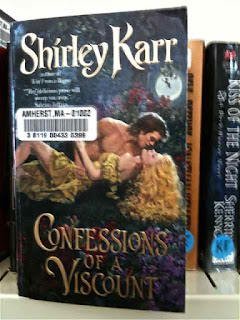The American politicians and publishers who, in the title of John Hench's prize-winning book, sought to use "Books as Weapons" in the war against fascism, thought they were making the world free for democracy. Of course, they were also making the world free for free markets, and thereby, not just for Hemingway, Steinbeck, Saroyan, and the other authors whom they held up as models of civic engagement and cultural achievement, but also for all sorts of literary trash.
To put it another way: the price of liberty is eternal kitsch. Of course, that's the price of "totalitarianism," too, though in different ways and for different reasons. While I was in Prague this spring, I saw a massive and fascinating exhibition on the stifling of modernism and the avant-garde, first, by the Nazis, and then by the communists.
For many of us, the romance novel epitomizes American literary kitsch. To be sure, the genre and its readership have become the subject of scholarly study: one thinks first and foremost of the pioneering work of Janice Radway, who provocatively argued against the dominant condescension toward both.
Sorry, I digressed: I was starting to risk venturing into the serious, which is not at all my purpose here.
Anyway, when it comes to the romance novel, many of just appreciate the lame titles and cheesy cover art. The titles may not be as distinctive and clever as those of classic country and western songs, but like them, they do adhere to certain conventions and constitute a sort of subgenre in their own right. In this case, though, one suspects that the humor is accidental, or at any rate, if implicitly part of the publishers' intent, not uppermost in the minds of their consumers.
This spring, as the Amherst Historical Commission prepared to put forward a request for Community Preservation Act funds for the restoration of paintings hanging in the Jones Library (still need to post about that), I took a stroll through the building to re-familiarize myself with the location of each work of art.
Lo and behold, I came across one of the canvases— Paul Dominique's late 19th-century "Arabs Mounted in Battle"—hanging over: the romance collection.
To me, it actually seemed entirely appropriate. Whereas some might see a glaring contrast between this "high" work of art—after all, it's an oil painting more than a hundred years old, in an elaborate gilded frame (what more need one know?)—and the genre literature of mass cultural production below, I see but variations on a theme.
To be sure, the painting is "historically significant" (otherwise we could not fund its preservation), and reasonably competent, but it is a typical piece of orientalism, depicting the exotic "otherness" of Arab culture for the delight of the western viewer. Unlike a book published in a pressrun of tens or hundreds of thousands of copies, Dominique's painting is a cultural product that exists in but one exemplar, and yet for all that, it is interchangeable with dozens if not hundreds of others. In its own way, it is every bit as conventional as the romance novel—and conventional ideals, representations, and sentiments are the hallmarks of kitsch.
And of course the connection doesn't end there. The Arab male has long functioned as a figure combining danger and allure. One need but think of Valentino and the vogue of "the sheik" theme, derived from the novel of the same name by E. M. Hull (whose real name was not the same: Edith Maude Winstanely). In fact, as the publishers of the new edition remind us, "The Sheik is recognized as the immediate precursor to the modern romance novel." Apparently, the theme has even been making something of a comeback. Oy (as they say). [this ¶ was accidentally omitted from the original upload.]
A classic debate in library philosophy has been whether to collect comprehensively or selectively: as much as possible, or only "the best": what Matthew Battles called the distinction between the "universal" and "Parnassan" ideals of the library. On the local level, this most often gets translated into debates about whether to purchase popular fiction, controversial political works, and the like. Romance novels are among the most contentious genres. The limited evidence suggests that most public libraries do have fairly extensive holdings of romances, though precise patterns of acquisition and funding are less clear. Most libraries have a romance novel collection because there is public demand for it and they serve the public; and there's nothing wrong with that.
Damn. I keep getting serious. Must. Stop. Now.
So, back to those romance titles and covers. One of my favorite "tweeps" and library bloggers, Rita Meade, a.k.a. Screwy Decimal (here, the blog; here, the Twitter account; further: 1, 2, 3) has made a minor art of chronicling the inanity and inadvertent humor of romance titles and romance novel culture—to which she adds her own very intentional humor under the rubric, "Romance Title of the Day," e.g.:
• 'Sex in the Middle Ages.' Well, I hope they practiced serf sex.I promised Rita I'd share some of our local examples.
• 'His Virgin Secretary.' Well, I guess it's something to put on the ol' resume.
• 'His Pregnancy Bargain.' I love when a man puts the "us" in uterus
At any rate, without further ado, here's my modest contribution. My favorite is One Fine Cowboy: He's got a way with horses. . . and with women . . . . Feel free to supply your own commentary. The possibilities are almost endless.
 |
| The Dangerous Baron Leigh |
 |
| One Fine Cowboy |
 |
| A Pregnant Proposal |
 |
| Confessions of a Viscount |










1 comment:
'A Pregnant Proposal' might be one of my favorites yet. Thank you for sharing!
Also, this - "Most libraries have a romance novel collection because there is public demand for it and they serve the public; and there's nothing wrong with that." - warms a librarian's heart. :)
Post a Comment